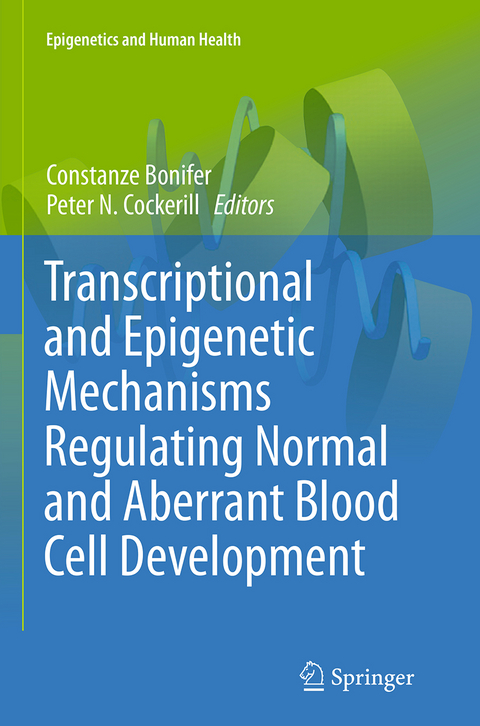
Transcriptional and Epigenetic Mechanisms Regulating Normal and Aberrant Blood Cell Development
Seiten
2016
|
1. Softcover reprint of the original 1st ed. 2014
Springer Berlin (Verlag)
978-3-662-51466-5 (ISBN)
Springer Berlin (Verlag)
978-3-662-51466-5 (ISBN)
During vertebrate hematopoiesis many specialized cell types are formed with vastly different functions such as B cells, T cells, granulocytes, macrophages, erythrocytes and megakaryocytes. To tightly control the enormous proliferative potential of developing blood cells, an intricately balanced signaling and transcription network has evolved that ensures that the different cell types are formed at the right time and in the right numbers. Intricate regulatory mechanisms ensure that blood cells function properly and have a determined life span. Moreover, in the adaptive immune system, long-lived memory cells have evolved that ensure that when pathogens have been seen once they will never cause a problem again. In this book we will therefore make a journey from asking how more primitive organisms use the epigenetic regulatory machinery to balance growth with differentiation control towards digging deep into what controls the function of specialized cells of the human immune system. We will first discover that flies make blood but exist without blood vessels, why fish make blood cells in the kidney and which precise genetic circuitries are required for these developmental pathways. We will then learn the regulatory principles that drive the differentiation of mature blood cells from stem cells and what controls their function in mammals. In the process, we will find out what unites hematopoietic stem cells and endothelial cells. Finally, we will shed light on the molecular mechanisms that either alter hematopoietic cell differentiation or lead to the development of cells with impaired function.
Preface.- Introduction.- Non-mammalian hematopoiesis.- Epigenetic mechanisms regulating mammalian hematopoietic stem cell development and function.- Epigenetic and transcriptional mechanisms regulating cell fate decisions and blood cell lineage development.- Epigenetic control of immune cell function.- Subject index.
| Erscheinungsdatum | 29.08.2016 |
|---|---|
| Reihe/Serie | Epigenetics and Human Health |
| Zusatzinfo | XIII, 416 p. 49 illus. in color. |
| Verlagsort | Berlin |
| Sprache | englisch |
| Maße | 155 x 235 mm |
| Themenwelt | Medizin / Pharmazie ► Medizinische Fachgebiete ► Onkologie |
| Studium ► 2. Studienabschnitt (Klinik) ► Humangenetik | |
| Schlagworte | Biomedical and Life Sciences • blood cell lineage development • Cancer Research • epigenetic regulatory machinery • hematopoietic stem cells • Human genetics • immune deficiencies • medical genetics • non-mammalian hematopoiesis • Oncology • transcriptional mechanisms |
| ISBN-10 | 3-662-51466-4 / 3662514664 |
| ISBN-13 | 978-3-662-51466-5 / 9783662514665 |
| Zustand | Neuware |
| Haben Sie eine Frage zum Produkt? |
Mehr entdecken
aus dem Bereich
aus dem Bereich
Eine sehr persönliche Geschichte | Der New York Times-Bestseller
Buch | Softcover (2023)
Ullstein Taschenbuch Verlag
CHF 30,75
Die revolutionäre Medizin von morgen (Lifespan)
Buch | Softcover (2020)
DuMont Buchverlag
CHF 22,40
Buch | Softcover (2022)
John Wiley & Sons Inc (Verlag)
CHF 169,95


